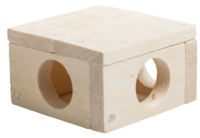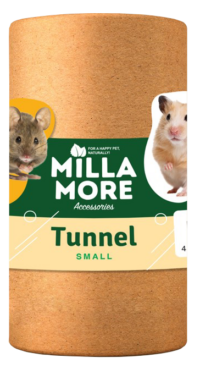Caring for your rat
Caring for your rat
What type of cage does a pet rat need?
The best home for your rats is a wire cage – the larger and taller the better, as rats are active and love to climb. Hamster cages are not big enough. A rat cage should be at least 90cm long, by 60cm deep, by 150cm tall.
The floor should be solid rather than wire, with a solid tray underneath, to avoid a rat trapping and injuring its feet or limbs. Aquarium-style glass cages shouldn’t be used because the ventilation isn’t good enough.
Litter should be put on the floor to absorb ammonia from droppings. Litter training your rats will help to keep their cage clean. Use dust-extracted bedding to avoid respiratory problems. Cat litter is unsuitable as bedding but can be used in your rat’s litter tray.
Rats also need a nest box where they can sleep and enjoy a bit of peace and quiet. A cardboard box with shredded paper bedding is ideal. They also enjoy a hammock hanging in their cage – this can easily be made from an old towel or similar material. Rats are susceptible to extreme cold and heat dehydration, both of which can be fatal, so make sure the cage is in a suitable environment away from direct sunlight and draughts.
What should I feed my pet rat?
Rats are omnivores and love a varied diet that includes grains, vegetables and a protein source such as dry dog food. Commercial mixes are available from pet shops. While rats are fond of titbits and household scraps, do not let them get too fat. They enjoy occasional pieces of fruit, vegetables, peanuts and sunflower seeds, but these can cause skin problems, so should be a rare treat.
Fresh, clean water must always be available. If a water bottle is used it should be cleaned, refilled and checked daily to ensure it is not blocked or leaking.
Health issues in pet rats
Check your rat daily for any general signs of ill health, such as loss of appetite or lethargy. One of the most common problems in rats is infectious respiratory disease but this can only be passed from one rat to another – it can’t affect other species or humans. Be wary of buying a rat from somewhere with many other rats, particularly if any of them have rapid or noisy breathing. Other respiratory problems are also common in rats.
Red discharge around the eyes or nose is a sign of illness and stress, although the redness is not blood but a natural pigment in the mucus. Some rats develop tumours as they get older – these are more common in females.
While rats can be easily castrated, it is generally only necessary to prevent unwanted breeding or to stop the occasional aggression towards other rats or humans.
Rats are naturally very clean and spend a lot of time grooming themselves, although some may need their tails cleaned occasionally. This should be done gently with mild animal shampoo. If you are worried about any change in your rat’s health, consult your vet.
Exercise and entertainment for your pet rat
Rats need at least an hour’s playtime outside their cage every day, but you must first make the room safe and rat- proof. Keep doors and windows closed and block cracks in floorboards, as rats can get through seemingly impassable gaps. Keep house plants out of the way because some are poisonous to rats. Electric cables should be passed through piping so they cannot be chewed. Rats may enjoy toys such as pieces of plastic drainpipe or cardboard boxes, but avoid wheels with spokes as they can cause a serious injury.
Company for your pet rat
Rats naturally live in social groups so it is unfair to keep one alone. A same-sex pair or group will be much happier and two rats don’t cost much more to keep than one.
Handling your pet rat
Rats that are handled correctly soon after they are born will enjoy it. To help them get used to you, try carrying them around the house inside your jumper! Never pick up a rat by its tail as this can injure them. Instead, put one hand underneath its chest behind its forelegs, and support the hindlegs with your other hand, holding but not squeezing. Children will enjoy handling rats, but must be supervised to make sure they do not hold them too tightly.
Rats as children’s pets
Rats make good companions for children and adults. However, they do need daily social interaction and time out of their cage, so it is important that everyone in the family is keen on the idea of keeping rats as pets. Rats need larger cages than the smaller rodents but, being larger, they are easier to handle than small rodents. As with all children’s pets, it is important that an adult is responsible for making sure the rats receive the attention and care they need.




